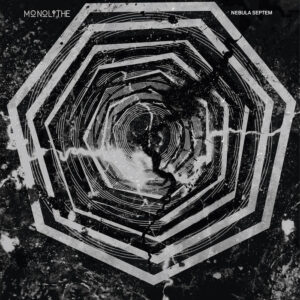It’s been a long time since I’ve come across a Doom metal album as inventive and dark as Monolithe’s latest opus. Perhaps I should say a nominally doom album, for although the band has its roots in doom and death metal, there is so, so much more to ‘Nebula Septem’ than simple genre tropes. A grand, epic piece of music that ebbs and flows over the course of seven tracks, ‘Nebula Septum’ is thematically crafted so that each of the seven tracks lasts exactly seven minutes to correspond with the seven musicians involved in the making of the album and the fact that it is their seventh album. Few artists would be so compulsive in their artistic development, yet it goes deeper still. The tonality of each song is one of the seven notes of the western scale, the title of each song starts with one of the first seven letters of the alphabet – A-G and that letter also corresponds to the key of each piece of music. It may seem bordering on the obsessive, but it is clear from the outset that such attention to detail has focused the band’s collected energy and the result is a monstrously ambitious album that demands and holds your attention.
It is rare that a heavy album so instantly and impressively transmits its intentions, but opener ‘Anechoic Aberration’ is a doom masterpiece, layered with keyboards and given a deathly edge thanks to the scabrous vocals. Yet, despite its colossal bottom end and harrowing aspect, the track is notable for the rich melody that the band have woven into every fibre of its being, the towering riffs conjuring images of decaying civilisations on far flung planets. If this were the soundtrack to a sci-fi odyssey, it would be one directed by Stanley Kubrick and that same sense of compulsive attention to detail that was the hallmark of the late director is very much in evidence here. Blazing with the intensity of a thousand stars, ‘Burst in the event horizon’ eschews the introspective riffing of traditional doom and, instead, focuses its aggression outwards. The result is a piece of music that is rather more death than doom, with devilishly detailed riffs layered over a propulsive back drop that will leave you gasping in its wake. Reminiscent of Emperor and even early Opeth, there’s a powerfully progressive feel to the music that is as darkly cerebral as it is ferocious. Still deftly weaving melody and might in equal measure, ‘coil shaped volutions’ is a stately piece of music with drawn out, Gilmour-esque guitar work adding further mystery to the band’s enigmatic compositions. It is remarkable form the outset, but don’t expect to absorb the myriad details the band have incorporated into their work all at once, this is music that needs time and attention to be fully appreciated. The first half of the album concludes with the gravity well that is ‘delta scuti’, a track which initially marches forth at funeral pace, the guitars chiming out as layers of vocals emerge from the blackness. Yet that is just the beginning for this watershed moment, and the band soon start to navigate a wider space. With synth elements deftly woven into the song as it edges ever further into unexplored territory, so the music changes in aspect, veering from the metallic might of the opening tracks to something more akin with Ulver and Arcturus.
As the LP spirals towards its end, so the music on each track becomes grander in scope. ‘Engineering the rip’ sees rippling synths falling over one another as the music, now firmly embedded in the grand traditions of progressive rock, races for the hitherto unreachable. It’s still metal, but twisted and transmuted by its unfathomable journey into something that feels entirely alien. That sense of the alien continues as rich piano and lightly throbbing electronica see penultimate track ‘fathom the deep’ exploring ambient territories before the flaming guitars emerge to propel the listener ever forward into the inky black. A truly grandiloquent piece of music, the brutal roars of Sebastien Pierre, whilst impressive, are wisely kept to a minimum here to allow the majesty of the music to emerge unscathed. The result is a piece that feels like the soundtrack to some unnamed movie and, when Sebastien is given free reign, the impact is all the greater. The final track, the instrumental ‘gravity flood’, perfectly concludes the album with dark wave synths reminiscent of Pink Floyd’s earliest expeditions into the beyond. Rather like ‘one of these days’ as filtered through Ulver, ‘gravity flood’ is a masterpiece of understated beauty that allows the album the epic finale that it truly deserves.
Where ‘Nebula Septem’ starts as a death/doom album, it rapidly becomes apparent that Monolithe have much, much more going on. Their ambition reveals itself slowly, each track building upon the progressions of its forebear before we finally emerge at the stunning ‘gravity flood’. Nothing here is overwrought or undercooked – the band clearly spent a long time honing these pieces – and the album is a subtle, sinister, engaging body of work of which the band should be justly proud. I can think f few artists capable of competing on so magisterial a level and it is arguable that ‘Nebula Septem’ is perfect on just about every level form concept to execution. Don’t think, don’t wait – this album is as essential as music gets and is absolutely stunning. 10




